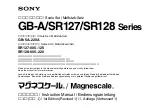
When You’re Maintaining Weight
Fluctuations in day-to-day weight tend to be smaller when weight is stable, so a
more frequent weigh-in pattern is helpful. To maintain a stable weight:
• Weigh yourself more often than once a week.
• Use the “5-pound rule” – research shows that people who keep weight within
a 5-pound range are more likely to maintain a healthy body weight over the
long term.
Instructions
for use of
Weight Watchers
bathroom scale
Scales by
™
Congratulations! By purchasing this
Weight Watchers Scale, you’ve made the
first step toward taking control of your
weight. To get the greatest benefit from
your purchase, please read this entire
brochure before using your scale.
COLOUR INFO
1/C job: Black
with bleed
- photo prints
IB-5903
Service Centers:
Conair Consumer Products Inc.
156 Parkshore Drive,
Brampton, Ontario.
L6T 5M1
1-800-472-7606
www.conaircanada.ca
*Heshka S, et al. Two-Year Randomized Controlled Study of Self-Help Weight Loss vs. A Structured
Commercial Program. The FASEB Journal 2001; 15(4):A623
©2005 Conair Consumer Products Inc. 156 Parkshore Drive, Brampton, Ontario, L6T 5M1. Made in China
©2005 Weight Watchers International Inc. All rights reserved. Weight Watchers is the
registered trademark of Weight Watchers International Inc. and used under license.
Important Information from Weight Watchers:
Your Scale is the best tool for monitoring weight. While not the only measure
of weight loss, scales are the most popular method used to gauge weight-loss
success. A scale measures the sum of your total body weight, which includes
bone, muscle, fat, and water.
Body weight fluctuates during the day, and from day to day, depending
on a variety of factors.
• Salt and carbohydrate intake can affect the body’s water retention.
• A large meal adds weight and can cause water retention.
• Dehydration from exercise, illness, or low fluid intake can result in weight loss.
• Muscle is also a factor. Heavy-duty resistance training can build muscle, which
can affect weight.
• The menstrual cycle can cause temporary weight gains and losses.
It’s important not to put too much stock in the exact number on the scale, because
it can and will vary. This is especially true when you’re dieting. Small weight gains
and losses are common as your body adjusts to fewer calories and more exercise.
When You’re Losing Weight
It’s important not to put too much stock in the exact number on the scale, because
it can and will vary. This is especially true when you’re dieting. Small weight gains
and losses are common as your body adjusts to fewer calories and more exercise.
Make the most of it!
Your scale is a valuable tool when used to track weight over a period of weeks and
months. Be aware that different scales often give different results. The scale at
your doctor’s office may show one weight and your scale at home another.
So don’t get too caught up with a single number.
Don’t Overdo It!
A surefire way to get overly concerned with your weight is to weigh yourself too
often. Weigh yourself no more than once a week when you’re dieting. Though it’s
hard to stick to this pattern, it’s the best way to prevent unnecessary concern with
normal weight fluctuations, which are unrelated to your weight-loss efforts.
Regardless of your weighing habits, it’s important that you’re consistent.
Here are 5 rules for effectively monitoring your weight – weigh yourself:
• Once a week, on the same day of the week
• At the same time of day
• In the same place
• Wearing the same clothes
• Using the same scale
To keep track of your weight, record only one number for the week. This
will give you a clear picture of any trend your weight is following.
Facts You Should Know
Your Weight Watchers scale is a precise measuring instrument that is most
accurate when weighing a stationary object. To ensure the most accurate
readings always try to stand on the same area of the scale platform and DO NOT
MOVE. Should the weight on the scale exceed the scale’s capacity, you may see
an error message ”ERR”.
Electronic sensors are sensitive. Be careful not to drop or jar the scale.
Place it gently onto floor surface, and store where it will be protected from impact.
The scale is an electronic instrument and should never be submerged in water.
Clean with damp cloth.
In the unlikely event that the scale battery malfunctions and needs to be replaced,
lift the snap on battery cover on the bottom of the scale and replace the old
battery with a 9V battery.
Do not attempt to open the scale or to remove any
components. Servicing should be done by qualified technicians only. See
warranty information on previous page.
Battery Replacement Instructions
1. Turn over the scale and open the battery door. (Push ribbed switch and pull up)
2. Replace old battery with one new 9V battery.
3. Close battery door.
4. Properly dispose of old batteries.
LIMITED TEN YEAR WARRANTY
Conair will repair or replace, at our option, your appliance free of charge for
120 months from the date of purchase if the appliance is defective in workman-
ship or materials.
To obtain service under this warranty, return the defective product to the service
centre nearest you, together with your sales slip and $7.50 for postage and
handling.
ANY IMPLIED WARRANTIES, OBLIGATIONS, OR LIABILITIES, INCLUDING BUT NOT
LIMITED TO THE IMPLIED WARRANTY OF MERCHANTABILITY AND FITNESS FOR
A PARTICULAR PURPOSE, SHALL BE LIMITED IN DURATION TO THE 120 MONTH
DURATION OF THIS WARRANTY.
IN NO EVENT SHALL CONAIR BE LIABLE FOR ANY SPECIAL, INCIDENTAL, OR
CONSEQUENTIAL DAMAGES FOR BREACH OF THIS OR ANY OTHER WARRANTY,
EXPRESS OR IMPLIED, WHATSOEVER.
This warranty gives you the specific legal rights, and you may also have other rights
which vary from province to province.
05CN1009
Model WW43C
WW43C_IB_EN.qxd 1/10/05 1:51 PM Page 1


























